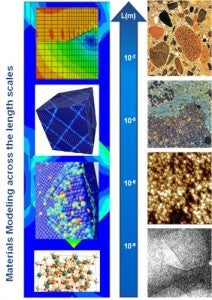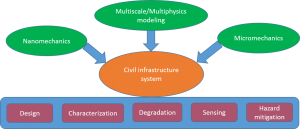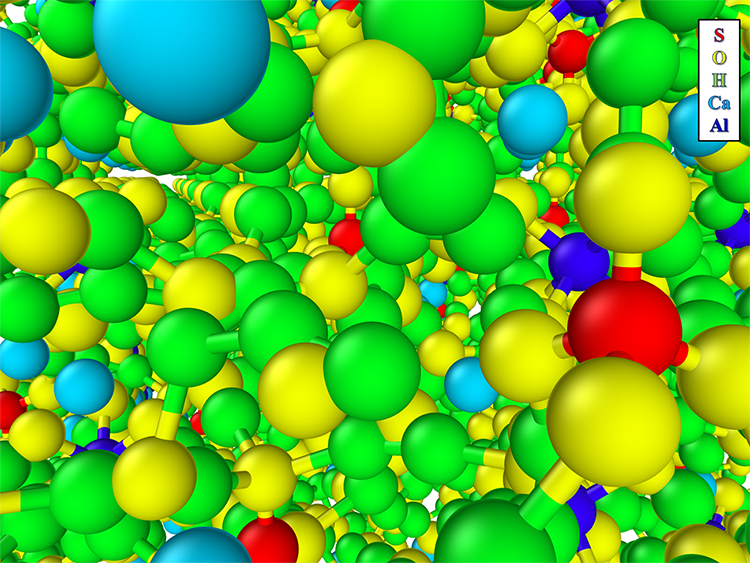
The MicroMechanics & Smart Infrastructure Lab is a combined fundamental and applicable research lab in which the projects are tightly binded with microscale experimenting and cross-scale modelling.
Stone-based infrastructure materials, e.g. Cement-based systems (e.g. concrete and mortar) and asphalt concrete systems are our primary area of research. Interest and experience in MicroMechanics & Infrastructure Lab research is motivated by characterizing and predicting material behavior through understanding microstructure evolution and degradation behaviors.

Both computational modeling and experimental measurements are crucial to understand, predict, and improve infrastructure performance. The cross-scale research focuses on the computational and experimental measurement of cement concrete, asphalt concrete, geomaterial, steel rebar and polymer, including simulation of microstructural development and prediction of mechanical properties of them. “Microstructure” ranges from nanometer to meter length scales, while mechanical properties include pressure-driven fluid transport, fracture, rheology, and durability. Available experimental methods including neutron scattering, electron microscopy, and various X-radiation probes like diffraction and tomography are used to inform and validate models.

Multifunctional Infrastructure Materials. Inspired by nature, intelligent stimuli–responsive materials mimic how natural materials and systems respond to stimuli such as light, heat, and electric fields. We strive to enable intelligent stimuli–responsive materials and integrate them in construction materials for energy-harvesting-storage, self-sensing, and self-healing infrastructure. To implement this multifunctional demand, we create the most promising strategies to overcome the many challenges in creating smart materials that provide the properties and characteristics needed for specific infrastructure applications.
Intelligent Stimuli–Responsive Materials emphasizes nanostructures as the basic building blocks for applications within a broad range of fields, including polymer science, organic chemistry, engineering, and multiscale-multiphysics modeling. The topics in our research cover:
- Nature–inspired, stimuli–responsive, self–folding materials
- Stimuli–responsive nanostructures from self–assembly of rigid flexible block molecules
- Stimuli–responsive, hybrid, metal nanoparticles and polymer gels
Critical Infrastructure Systems Resilience. Resilience deals with the response of the system in the face of hazard disruption and its ability to continue to provide the expected service delivery levels. It provides inclusive strategies that integrate both resistance (prevent, protect) and resilience (respond, recover) in the face of disasters. In the transportation, energy, telecommunication, and hydropower infrastructure, system shocks due to man-made and natural disasters occur frequently and result in substantial social-economic losses. It is therefore crucial to enhance the resilience of this infrastructure systems. Improving the resilience of systems creates a need for developing metrics that measure the current resilience of the system of the systems and provides a benchmark for evaluating different strategies for improving resilience. Dr. Lu is currently working on physical and mathematical modelling of systems’ response to change and allows decision-makers to assess the resilience of networked infrastructures from a multi-metric perspective. His research interests include risk-based complex engineering systems susceptible to disruptions, less vulnerable system design and operations, system of systems design, and measurement of resilient infrastructure systems.
Cyber Physical Systems Security. Cybersecurity is the protection of information systems from theft or damage to the hardware, the software, and to the information on them, as well as from disruption or misdirection of the services they provide. Dr. Lu is a cybersecurity faculty of the Computer Science PhD program partnering with other state and federal agencies to help engage with public and private sector partners through events and initiatives to raise awareness about cybersecurity. The research is concentrated on providing software, control system, and critical infrastructure systems with tools and resources needed to stay safe online, and increase the resiliency in the event of a cyber incident. The technical research focused on cybersecurity of industry control systems will also boost Cybersecurity Awareness, Training, and Education to ensure everyone has the resources they need to stay safer and more secure online.